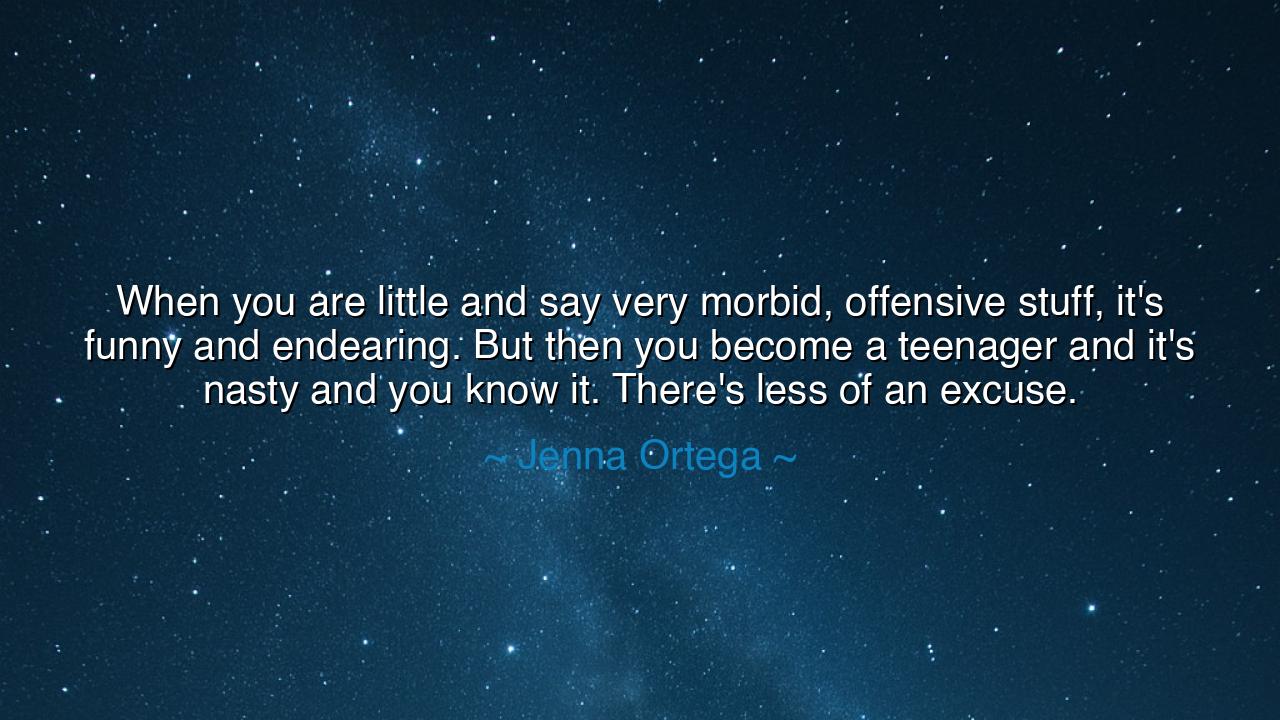
When you are little and say very morbid, offensive stuff, it's
When you are little and say very morbid, offensive stuff, it's funny and endearing. But then you become a teenager and it's nasty and you know it. There's less of an excuse.






When Jenna Ortega said, “When you are little and say very morbid, offensive stuff, it’s funny and endearing. But then you become a teenager and it’s nasty and you know it. There’s less of an excuse,” she revealed not merely a thought about humor or childhood, but a timeless reflection on innocence, awareness, and the moral weight of growing up. Her words speak of the sacred transition between the unknowing purity of youth and the conscious accountability of maturity — that inevitable moment when laughter gives way to understanding, and understanding gives way to responsibility. In this short, sharp observation lies the wisdom of ages: that what is forgiven in innocence becomes judged in awareness, and that wisdom begins when one can no longer hide behind unknowing.
The origin of this quote lies in Ortega’s reflection on her own dark and witty sensibility — her fascination with the macabre, which audiences have come to know through her portrayal of Wednesday Addams. Yet beneath the humor of her statement, there is a deeper truth. A child’s darkness is unintentional, a reflection of curiosity untempered by consequence. When a little one speaks of death or says something shocking, we laugh not because the thought is pure, but because the spirit that uttered it is pure. The child has no full knowledge of what they say — and so the world forgives. But as one grows and becomes aware of the meaning behind words, laughter fades and judgment begins. The same utterance, once innocent, becomes intentional, and therefore, moral. Ortega’s words remind us that the journey from childhood to adulthood is not merely biological — it is spiritual.
The ancients understood this sacred shift. The philosophers of old often spoke of innocence as a form of divine ignorance, a state in which the soul dwells before knowledge divides the world into good and evil. Eve in the garden, before the fruit was eaten, could speak to the serpent without guilt. But once the fruit was taken — once knowledge entered — innocence was lost, and awareness brought shame, not because the act itself changed, but because the meaning of the act did. So too, Ortega’s reflection mirrors this eternal pattern: when you are little, your words are fruitless — they carry no moral seed. But when you come of age, they become powerful, and power demands responsibility.
In the world of humor, this transformation is especially stark. The foolish child can jest about anything — death, cruelty, the grotesque — and evoke laughter, because no malice resides within them. But the knowing jester, the one who mocks the sacred or wounds with wit, wields danger. The ancients revered their jesters and poets, but they also feared them, for they knew that the tongue is a sword once sharpened by awareness. To speak with full knowledge of offense is to stand before truth itself — and that truth may judge you. Ortega’s recognition of this is not cynicism, but wisdom. She understands that the charm of the child becomes the test of the adult.
History offers many examples of this evolution. Consider the writer Mark Twain, who as a boy laughed freely at the absurdities of life, but as a man turned that laughter into a blade that cut through hypocrisy and injustice. His humor, once innocent, became purposeful — no longer the babbling of youth, but the weapon of awareness. Twain learned, as Ortega reminds us, that humor changes with consciousness. What is forgiven in ignorance must be refined in knowledge; what once made people laugh must eventually make them think. The transformation from childish mischief to mature expression is the evolution of the soul itself.
There is something both mournful and beautiful in Ortega’s observation — mournful because it laments the loss of innocence, beautiful because it celebrates the birth of conscience. We all walk this path: the child speaks without consequence, the adolescent learns consequence, and the adult must choose compassion. Awareness is the burden of growth, but it is also its crown. To feel the weight of one’s words, to know that humor can wound or heal, to understand that intention defines morality — these are signs not of constraint, but of spiritual awakening.
So, my listener, let this be your lesson: cherish the innocence that once made you fearless, but do not mourn its loss. Let it instead transform into wisdom. Speak still with laughter, but let your laughter carry understanding. Do not hide behind ignorance when you know the power of your words, for that is the cowardice of spirit. Instead, use that power as the ancients did — to enlighten, to comfort, to reveal truth. Childhood gives you curiosity; maturity gives you purpose. Marry the two, and you will find not the lost joy of youth, but a deeper, nobler joy — the joy of knowing, and still choosing kindness.
Thus, Jenna Ortega’s reflection becomes more than a remark on growing up; it is a mirror held before the soul. It reminds us that to grow in awareness is not to lose one’s lightness, but to refine it — to laugh still, but with wisdom; to speak boldly, but with heart. For innocence may end, but integrity begins where innocence leaves off — and there, the true art of being human begins.






AAdministratorAdministrator
Welcome, honored guests. Please leave a comment, we will respond soon